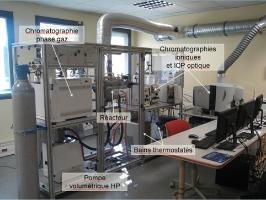Underground storage of energy
Carbon dioxide, which comes from burning fossil fuels, is one of the most common greenhouse gases.
One of the priority objectives of public policies is to reduce CO2 emissions and one solution is to capture and store CO2 using oxy-fuel combustion. Before the sequestration step, the CO2 must be purified. Innovative gas separation processes, such as high-pressure processes, require good knowledge of the thermodynamic properties of phase equilibria. Due to the absence of data, a pilot was developed to study the solubility of a gas mixture (CO2, O2, NOx, SO2) in aqueous solutions drawing on the know-how of the LaTEP as regards the thermodynamic characterization of pressure systems. Although this is a conventional CO2-water-NaOH system, innovative data were obtained under pressure. Based on these data, we were also able to propose a set of thermodynamic parameters that did not exist for this system until now.
In the next stage of the CCTS chain, the large-scale storage of carbon dioxide in deep geological systems is a solution for limiting the environmental acidification and climate change caused by this gas. Total has chosen to test this option in the Béarn region for storing the fumes from an oxy-fuel combustion pilot (composed mainly of carbon dioxide but also of impurities such as oxygen, NOx and SOx) which have been injected into a depleted natural gas reservoir.
Experimental characterization of three-phase electrolytic systems
Here too, implementation of this technology requires knowledge of physical, physico-chemical and phase interactions from capture to storage. Our work focuses on analyzing the impact of injecting a gas mixture (CO2 + O2) into reservoir rocks and cap rock in the presence of brine under the pressure and temperature conditions of CO2 storage (T <150 °C and P <200 bar). Research is focused on an innovative experimental pilot, which is used to acquire the thermodynamic and kinetic data essential for building thermodynamic and reactive models and performing simulations of the three-phase system (gas-brine-rocks).
